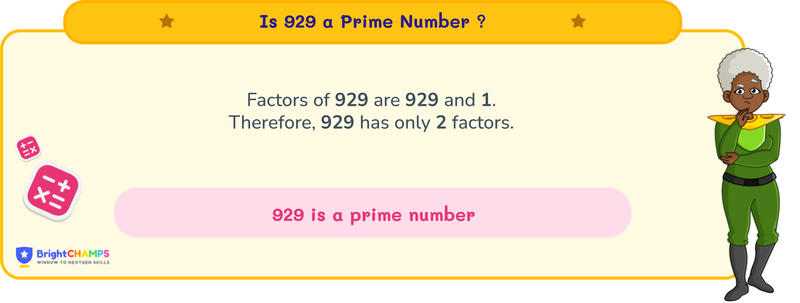
 147 Learners
147 LearnersLast updated on May 26th, 2025

Is 929 a Prime Number?

The numbers that have only two factors, which are 1 and itself, are called prime numbers. Prime numbers play a crucial role in encryption, computer algorithms, and barcode generation. In this topic, we will be discussing whether 929 is a prime number or not.
Is 929 a Prime Number?
There are two types of numbers, primarily —
Prime numbers and composite numbers, depending on the number of factors.
A prime number is a natural number that is divisible only by 1 and itself.
For example, 3 is a prime number because it is divisible by 1 and itself.
A composite number is a positive number that is divisible by more than two numbers.
For example, 6 is divisible by 1, 2, 3, and 6, making it a composite number.
Prime numbers follow a few properties like: -
- Prime numbers are positive numbers always greater than 1.
- 2 is the only even prime number.
- They have only two factors: 1 and the number itself.
- Any two distinct prime numbers are co-prime numbers because they have only one common factor, which is 1.
- As 929 has more than two factors, it is not a prime number.

Why is 929 Not a Prime Number?
The characteristic of a prime number is that it has only two divisors: 1 and itself. Since 929 has more than two factors, it is not a prime number. A few methods are used to distinguish between prime and composite numbers, such as:
- Counting Divisors Method
- Divisibility Test
- Prime Number Chart
- Prime Factorization
Using the Counting Divisors Method
The counting divisors method involves counting the number of divisors to categorize numbers as prime or composite. Based on the count of the divisors, numbers are categorized:
- If there is a total count of only 2 divisors, then the number would be prime.
- If the count is more than 2, then the number is composite.
Let’s check whether 929 is prime or composite.
Step 1: All numbers are divisible by 1 and itself.
Step 2: Divide 929 by 2. It is not divisible by 2, as it is an odd number.
Step 3: Divide 929 by 3. The sum of the digits (9+2+9=20) is not divisible by 3, so 929 is not divisible by 3.
Step 4: Check divisors up to the approximate square root of 929, which is about 30.5.
Step 5: Dividing 929 by 7 gives an integer quotient (132), making 7 a factor of 929.
Since 929 has more than 2 divisors, it is a composite number.
Using the Divisibility Test Method
We use a set of rules to check whether a number is divisible by another number completely or not. It is called the Divisibility Test Method.
Divisibility by 2: 929 is not divisible by 2, as it is an odd number.
Divisibility by 3: The sum of the digits is 20, which is not divisible by 3.
Divisibility by 5: The unit’s place digit is 9, so 929 is not divisible by 5.
Divisibility by 7: Dividing 929 by 7 gives an integer result (132), showing that 929 is divisible by 7.
Divisibility by 11: The difference between the sum of the digits in odd positions (9 + 9 = 18) and even positions (2) is 16, which is not divisible by 11.
Since 929 is divisible by 7, it has more than two factors, making it a composite number.
Using Prime Number Chart
The prime number chart uses a method called “The Sieve of Eratosthenes.” In this method, we follow the steps below:
Step 1: Write numbers starting from 1.
Step 2: Leave 1 without coloring or crossing, as it is neither prime nor composite.
Step 3: Mark 2 as a prime number and cross out all multiples of 2.
Step 4: Mark 3 as a prime number and cross out all multiples of 3.
Step 5: Continue this process to list primes. Through this process, we can identify prime numbers.
Since 929 is not found in the list of prime numbers, it is a composite number.
Using the Prime Factorization Method
Prime factorization is the process of breaking down a number into its prime factors and multiplying them to obtain the original number.
Step 1: We can write 929 as 7 × 133.
Step 2: Break down 133 further, which is 7 × 19.
Step 3: Now we have the product consisting of only prime numbers.
Hence, the prime factorization of 929 is 7 × 7 × 19.

Common Mistakes to Avoid When Determining if 929 is Not a Prime Number
Students might have some misconceptions about prime numbers when they are learning about them. Here are some mistakes that might be made by students.

FAQ on is 929 a Prime Number?
1.Is 929 a perfect square?
2.What is the sum of the divisors of 929?
3.What are the factors of 929?
4.What are the closest prime numbers to 929?
5.What is the prime factorization of 929?
Important Glossaries for "Is 929 a Prime Number"
- Composite Numbers: Natural numbers greater than 1 that are divisible by more than 2 numbers are called composite numbers. For example, 15 is a composite number because it is divisible by 1, 3, 5, and 15.
- Prime numbers: Natural numbers greater than 1 that have no divisors other than 1 and themselves. For example, 11 is a prime number.
- Divisibility rules: A set of rules to determine if a number is divisible by another number without performing division.
- Prime factorization: The process of expressing a number as a product of its prime factors.
- Sieve of Eratosthenes: An ancient algorithm used to find all prime numbers up to any given limit.
Explore More numbers


Hiralee Lalitkumar Makwana
About the Author
Hiralee Lalitkumar Makwana has almost two years of teaching experience. She is a number ninja as she loves numbers. Her interest in numbers can be seen in the way she cracks math puzzles and hidden patterns.
Fun Fact
: She loves to read number jokes and games.




